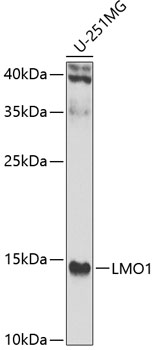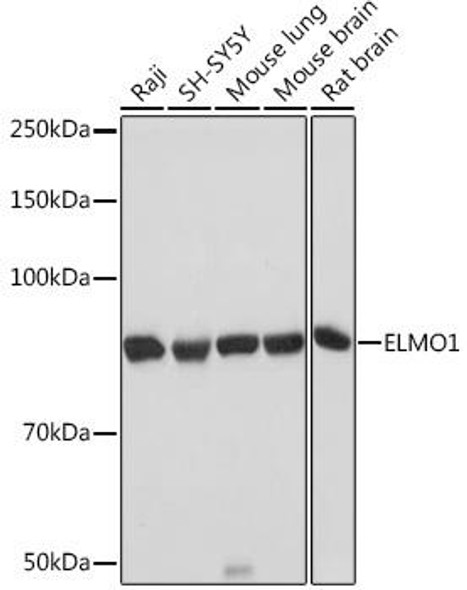Anti-LMO1 Antibody (CAB7561)
- SKU:
- CAB7561
- Product type:
- Antibody
- Reactivity:
- Human
- Host Species:
- Rabbit
- Isotype:
- IgG
- Antibody Type:
- Polyclonal Antibody
- Research Area:
- Cell Biology
Frequently bought together:
Description
| Antibody Name: | Anti-LMO1 Antibody |
| Antibody SKU: | CAB7561 |
| Antibody Size: | 20uL, 50uL, 100uL |
| Application: | WB |
| Reactivity: | Human |
| Host Species: | Rabbit |
| Immunogen: | Recombinant fusion protein containing a sequence corresponding to amino acids 1-156 of human LMO1 (NP_002306.1). |
| Application: | WB |
| Recommended Dilution: | WB 1:500 - 1:2000 |
| Reactivity: | Human |
| Positive Samples: | U-251MG |
| Immunogen: | Recombinant fusion protein containing a sequence corresponding to amino acids 1-156 of human LMO1 (NP_002306.1). |
| Purification Method: | Affinity purification |
| Storage Buffer: | Store at -20°C. Avoid freeze / thaw cycles. Buffer: PBS with 0.02% sodium azide, 50% glycerol, pH7.3. |
| Isotype: | IgG |
| Sequence: | MMVL DKED GVPM LSVQ PKGK QKGC AGCN RKIK DRYL LKAL DKYW HEDC LKCA CCDC RLGE VGST LYTK ANLI LCRR DYLR LFGT TGNC AACS KLIP AFEM VMRA RDNV YHLD CFAC QLCN QRFC VGDK FFLK NNMI LCQM DYEE GQLN GTFE SQVQ |
| Gene ID: | 4004 |
| Uniprot: | P25800 |
| Cellular Location: | Nucleus |
| Calculated MW: | 17kDa |
| Observed MW: | 14kDa |
| Synonyms: | LMO1, RBTN1, RHOM1, TTG1 |
| Background: | This locus encodes a transcriptional regulator that contains two cysteine-rich LIM domains but lacks a DNA-binding domain. LIM domains may play a role in protein interactions; thus the encoded protein may regulate transcription by competitively binding to specific DNA-binding transcription factors. Alterations at this locus have been associated with acute lymphoblastic T-cell leukemia. Chromosomal rearrangements have been observed between this locus and at least two loci, the delta subunit of the T-cell antigen receptor gene and the LIM domain binding 1 gene. Alternatively spliced transcript variants have been described. |
| UniProt Protein Function: | LMO1: May be involved in gene regulation within neural lineage cells potentially by direct DNA binding or by binding to other transcription factors. A chromosomal aberration involving LMO1 may be a cause of a form of T-cell acute lymphoblastic leukemia (T-ALL). Translocation t(11,14)(p15;q11) with TCRD. |
| UniProt Protein Details: | Protein type:Oncoprotein; DNA-binding Chromosomal Location of Human Ortholog: 11p15 Cellular Component: nucleus Molecular Function:zinc ion binding Biological Process: positive regulation of transcription from RNA polymerase II promoter; negative regulation of transcription from RNA polymerase II promoter |
| NCBI Summary: | This locus encodes a transcriptional regulator that contains two cysteine-rich LIM domains but lacks a DNA-binding domain. LIM domains may play a role in protein interactions; thus the encoded protein may regulate transcription by competitively binding to specific DNA-binding transcription factors. Alterations at this locus have been associated with acute lymphoblastic T-cell leukemia. Chromosomal rearrangements have been observed between this locus and at least two loci, the delta subunit of the T-cell antigen receptor gene and the LIM domain binding 1 gene. Alternatively spliced transcript variants have been described. [provided by RefSeq, Jul 2012] |
| UniProt Code: | P25800 |
| NCBI GenInfo Identifier: | 394025675 |
| NCBI Gene ID: | 4004 |
| NCBI Accession: | NP_001257357.1 |
| UniProt Secondary Accession: | P25800,Q4VBC5, Q8IXR0, E9PSF5, |
| UniProt Related Accession: | P25800 |
| Molecular Weight: | Calculated MW: 17kDaObserved MW: 14kDa |
| NCBI Full Name: | rhombotin-1 isoform b |
| NCBI Synonym Full Names: | LIM domain only 1 (rhombotin 1) |
| NCBI Official Symbol: | LMO1 |
| NCBI Official Synonym Symbols: | TTG1; RBTN1; RHOM1 |
| NCBI Protein Information: | rhombotin-1 |
| UniProt Protein Name: | Rhombotin-1 |
| UniProt Synonym Protein Names: | Cysteine-rich protein TTG-1; LIM domain only protein 1; LMO-1; T-cell translocation protein 1 |
| Protein Family: | Rhombotin |
| UniProt Gene Name: | LMO1 |
| UniProt Entry Name: | RBTN1_HUMAN |








